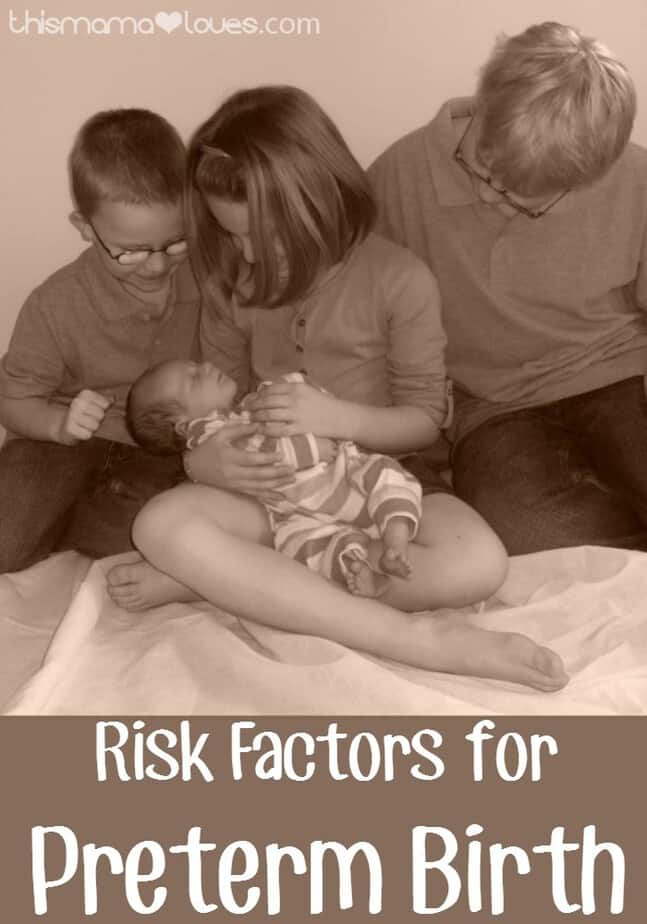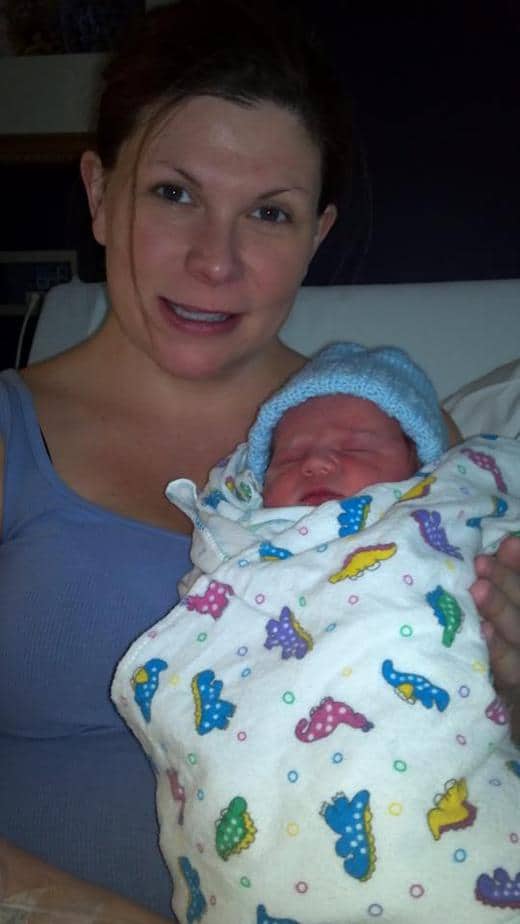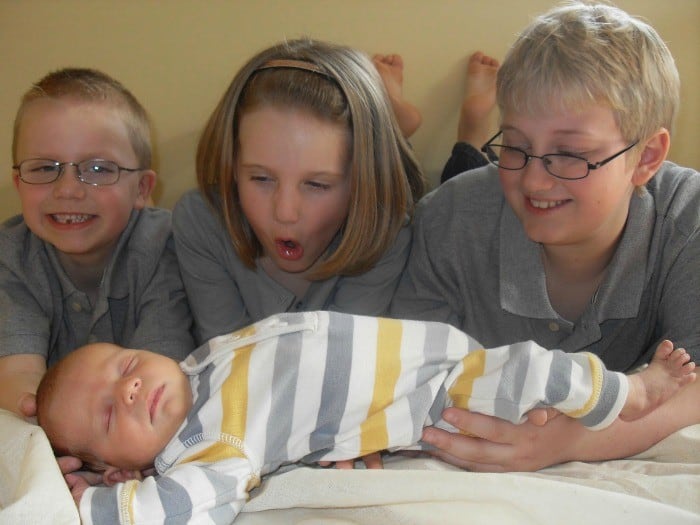My husband and I have a BIG blended family. Between us we have 7 children, SEVEN! When we got married 8 years ago we each came to the marriage with two children and eventually we decided to have a child together (and another, and another). Both of his children were born at full term and had no complications. Both my pregnancies were completely normal, great even and were also full term. When I got pregnant with our first son together I never imagined that pregnancy would be anything different. I had no reason to believe, even through most of the pregnancy, that everything wouldn’t be “normal” or that our baby boy would come early. I thought I knew many of the Risk Factors for Preterm Birth and those didn’t seem to apply to me.

Risk Factors for Preterm Birth
I was around 5 months pregnant when I had a dream about having the baby early. I wasn’t due until March but I had a dream about having him in early February. It was unsettling enough that I started preparing things, thinking that if baby did come early I wanted to be ready. I had always had great prenatal appointments and my doctor had no reason to believe that I might be at risk for preterm birth.
On the 10th of February I went to a regularly scheduled prenatal appointment and though I had been having lots of Braxton Hicks contractions, up until that appointment nothing was out of the norm. At the appointment my doctor became concerned that baby was breach and though there was still a month until his due date, he sent me for an ultrasound. While I waited for the ultrasound at the hospital what I thought were Braxton Hicks contractions became strong and regular and before they could do the ultrasound I was transferred to labor and delivery where I was found to be in labor, at 35 weeks and 4 days. He wasn’t breach and the next day we were holding our tiny baby boy, just over 6lbs.

He was small but healthy and perfect in every way. They did some testing and we were able to bring him home within a couple of days with no treatment or monitoring needed. He was just under 6lbs and on a biliblanket for several days to help with neonatal jaundice. He’s done just fine and though he’s a little smaller than kids his age, he is healthy, happy, smart, and oh so loved! This photo was shortly after he was born and his older siblings are clearly in awe.

Preterm birth (defined as before 37 weeks) is a large health and economic problem in the U.S. Traditional methods fail to identify the potential of preterm birth in the majority (more than 85%) of asymptomatic women carrying a single child. I was very lucky in that my baby didn’t experience any health problems as a result of his preterm birth but many, too many babies are being born far too early with health problems that can last a lifetime. In the United States 1 in 10 pregnancies end in premature birth.
Certain women are at increased risk of preterm birth and never know it. 50% of women who go onto have a premature birth have no known risk factors, like me. While the best predictor of preterm birth is a previous spontaneous preterm birth, 40% of women who have premature babies are first time moms who are certainly not expecting this to happen.
The PreTRM test is a prenatal blood test that is ordered by a woman’s healthcare provider and drawn during the 19th or 20th week of pregnancy. The results are delivered back to the healthcare provider where he/she will have a consultation with the patient and determine the next steps in her pregnancy management,based on the individualized risk assessment. This is important because predicting early provides doctors the information they need to proactively monitor the pregnancy more closely if the result is high-risk. The test can also give the patient the opportunity to prepare for an early delivery and plan accordingly, not relying on dreams or premonitions like I did. If a woman is at low risk they can feel some peace of mind about delivering early. PreTRM is the first and only prenatal blood test that is clinically validated to be an excellent predictor of preterm birth in all asymptomatic women who are pregnant with one baby, early in her pregnancy.
The last few weeks of pregnancy, weeks 37-40, allow a baby’s brain and lungs to fully mature. Common, known Risk Factors for Preterm Birth include the following:
- Having a close family member have a premature baby (sister, mother, grandmother)
- Having less than 18 months since your last pregnancy
- Having had a miscarriage
- Being 35 years old or older
- Being 17 year old or younger
- Being African American
- Having diabetes
- Having high blood pressure
- Getting pregnant through IVF
- Being a smoker
- Being pregnant with multiples – twins, triplets, or more
Unfortunately not having any of these symptoms doesn’t mean you will go full term with your pregnancy. Visit The PreTRM for more information about the test and how it can help determine if you might be at risk without having any of these common factors. It may just offer you peace of mind and help you prepare if you are determined to be at high risk for a preterm delivery of your baby. Talk to your doctor about PreTRM to find out if you’re at risk for having a preemie.
Have you or anyone in your family experienced a preterm birth?
This is a sponsored post. However, all thoughts and opinions are my own.
Jennifer says
You are a great mom of seven adorable children. Giving birth is a lofty vocation. Btw, thanks for the informative sharing. It does help a lot.
krystal says
I worried about this myself. It is important to know the risks ahead of time so you can prepare yourself!
Eloise says
OMGosh! 7 kids, that’s a full house! well it’s good to know the risk factors for people wanting kids (I’ve got 2 and I’m done!) great info!
Katherine G says
I never thought about any of these factors. My son came a few weeks early. He’s a healthy 14 year old . My daughter was only a few days early. This may be why because I have had a few family members who had their babies early. I wish this test was around when I was having my babies.
Claudia Krusch says
My son was premature and I was very scared! Thank god he was born with no issues!
Mike says
That is quite a story….so glad your baby was ok. It is so crazy that you had that dream…i wonder if you were thinking about it so much that it became a reality…hmmmm
Ourfamilyworld says
Oh, this is really risky. We have a friend who undergoes pre-term labor before.
diana says
Wow, thanks for sharing this! I’m happy to hear that there is a test out there to help women prepare if they are at high risk for a preterm labor. Very scary!
Stephanie Pass says
Well this is scary. I have a couple of these risk factors and am pregnant with #4. All 3 of my other kids were full term.
Christy Garrett says
I had my daughter a few days before her due date and my boys were late. I thought I was going to have my youngest early but each time I went to labor and delivery, I was just having mild contractions.
Ann Bacciaglia says
My Sister had preterm labor but the Doctor was able to stop it before it progressed to far. I did not know these risk factors.
Melissa Dixon says
I have never had to deal with this in the past but I have known some people who have. I actually was the opposite with my daughter according to the doctors I was 1 month overdue before they induced me against my wishes.
Vera Sweeney says
He is adorable!!! It is crazy how fast preterm labor can set in when you are pregnant, this is a great list of risk factors for preterm labor.
Amanda Simkin says
I never had any signs or fears of preterm labor but I know that it can be a very scary and dangerous thing. Knowledge is power so I will be sharing this post with friends who are expecting.
Mistee Dawn says
I know how scary that can be. I was so scared when I was pregnant. But mine was not early, she was late. Still scary!
Nancy at Whispered Inspirations says
My eldest came on her due date and my youngest was a week over due. I made sure to read up on the risks as well. This is so useful.
lisa says
I think it’s great that there is a test to determine if you are at risk for pre term labor. I have a few friends that are having babies now that we’re older and I know that can be a risk factor too.